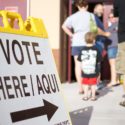Rep. Alexandria Ocasio-Cortez was asked in an interview with Latino Rebels whether the diaspora — that is, stateside Puerto Ricans — would be able to vote in the new status referendum proposed in The Puerto Rico Status Act. She answered the question with another question, or series of questions:
“Where would diaspora residents get to vote? How do you define Diaspora—second, third generation? Would Act 60 recipients who don’t really have the same community investment on the island but have disproportionate financial investments, whether they’ve lived here a short period, would they be able to vote?”
One state can’t vote on another state’s business
Allowing stateside Puerto Ricans to vote in an election about Puerto Rico’s status would set a difficult precedent. Would that mean that people born in California but living in Delaware should be able to vote in California elections? What about the children of people born in California who were themselves born in Delaware? Does it make a difference if they have never lived in California and never plan to?
Any decision made in this case would have effects on future decisions.
However, especially given the likelihood that the status decision could affect citizenship, the eventual status of Puerto Rico could directly affect the lives of people living in the states. A person born in Puerto Rico and living in Delaware could lose her U.S. citizenship if statehood did not gain the majority of votes.
Supporters of other status options blithely state that this would never happen, that Congress cannot or would not take U.S. citizenship away from current U.S. citizens in real life. We also believe that statehood will win again, whether the diaspora gets a vote or not, so it will not change the results in real life.
But this is a gamble. If people who do not live in Puerto Rico pushed the vote to independence, the people living in Puerto Rico would have to live with that decision, while the people living in the states could continue to reap the benefits of statehood in spite of their votes.
Non-native residents of Puerto Rico
The flip side of the question about whether the diaspora should be allowed to vote is whether those who are not bona fide residents of Puerto Rico should be allowed to vote.
Ocasio-Cortez phrased this as “act 60 recipients,” referring to people who move from a state to Puerto Rico in order to get tax benefits. The IRS has suggested that many of these people do not really live in Puerto Rico and there are real questions about whether they bring anything at all to Puerto Rico’s community or economy.
But there are also U.S. citizens living in Puerto Rico who were not born there. If they are bona fide residents who have made their lives on the Island, the U.S. Constitution will probably protect them from being excluded from the vote.
How then would they prove that they are bona fide residents? The IRS has criteria for showing real residence in Puerto Rico, but will those criteria work for voting rights as well?
What about people born in Puerto Rico who have homes in Puerto Rico and in a state? Should the criteria be different for them than for people in the same position who were not born in Puerto Rico?
All these questions would have to be sorted out before a vote can be taken.








No responses yet